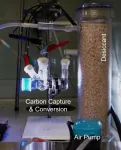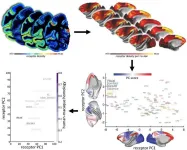(Press-News.org) Quantum technology is expected to fundamentally change many key areas of society. Researchers are convinced that there are many more useful quantum properties and applications to explore than those we know today. A team of researchers at Chalmers University of Technology in Sweden have now developed open-source, freely available software that will pave the way for new discoveries in the field and accelerate quantum research significantly.
Within a few decades, quantum technology is expected to become a key technology in areas such as health, communication, defence and energy. The power and potential of the technology lie in the odd and very special properties of quantum particles. Of particular interest to researchers in the field are the superconducting properties of quantum particles that give components perfect conductivity with unique magnetic properties. These superconducting properties are considered conventional today and have already paved the way for entirely new technologies used in applications such as magnetic resonance imaging equipment, maglev trains and quantum computer components. However, years of research and development remain before a quantum computer can be expected to solve real computing problems in practice, for example. The research community is convinced that there are many more revolutionary discoveries to be made in quantum technology than those we know today.
Open-source code to explore new superconducting properties
Basic research in quantum materials is the foundation of all quantum technology innovation, from the birth of the transistor in 1947, through the laser in the 1960s to the quantum computers of today. However, experiments on quantum materials are often very resource-intensive to develop and conduct, take many years to prepare and mostly produce results that are difficult to interpret. Now, however, a team of researchers at Chalmers have developed the open-source software SuperConga, which is free for everyone to use, and specifically designed to perform advanced simulations and analyses of quantum components. The programme operates at the mesoscopic level*, which means that it can carry out simulations that are capable of ‘picking up’ the strange properties of quantum particles, and also apply them in practice. The open-source code is the first of its kind in the world and is expected to be able to explore completely new superconducting properties and eventually pave the way for quantum computers that can use advanced computing to tackle societal challenges in several areas.
“We are specifically interested in unconventional superconductors, which are an enigma in terms of how they even work and what their properties are. We know that they have some desirable properties that allow quantum information to be protected from interference and fluctuations. Interference is what currently limits us from having a quantum computer that can be used in practice. And this is where basic research into quantum materials is crucial if we are to make any progress,” says Mikael Fogelström, Professor of Theoretical Physics at Chalmers.
These new superconductors continue to be highly enigmatic materials – just as their conventional siblings once were when they were discovered in a laboratory more than a hundred years ago. After that discovery, it would be more than 40 years before researchers could describe them in theory. The Chalmers researchers now hope that their open-source code can contribute to completely new findings and areas of application.
“We want to find out about all the other exciting properties of unconventional superconductors. Our software is powerful, educational and user-friendly, and we hope that it will help generate new understanding and suggest entirely new applications for these unexplored superconductors,” says Patric Holmvall, postdoctoral researcher in condensed matter physics at Uppsala University.
Desire to make life easier for quantum researchers and students
To be able to explore revolutionary new discoveries, tools are needed that can study and utilise the extraordinary quantum properties at the minimal particle level, and can also be scaled up large enough to be used in practice. Researchers need to work at mesoscopic scale*. This lies at the interface between the microscopic scale, i.e. the atomic level at which the quantum properties of the particles can still be utilised, and the macroscopic scale which measures everyday objects in our world which, unlike quantum particles, are subject to the laws of classical physics. On account of the software’s ability to work at this mesoscopic level, the Chalmers researchers now hope to make life easier for researchers and students working with quantum physics.
“Extremely simplified models based on either the microscopic or macroscopic scale are often used at present. This means that they do not manage to identify all the important physics or that they cannot be used in practice. With this free software, we want to make it easier for others to accelerate and improve their quantum research without having to reinvent the wheel every time,” says Tomas Löfwander, Professor of Applied Quantum Physics at Chalmers.
More about the research:
The scientific article SuperConga: An open-source framework for mesoscopic superconductivity has been published in Applied Physics Reviews and was written by Patric Holmvall, the Department of Physics and Astronomy, Uppsala University, and
Niclas Wall Wennerdal, Mikael Håkansson, Pascal Stadler, Oleksii Shevtsov, Tomas Löfwander and Mikael Fogelström, the Department of Microtechnology and Nanoscience at Chalmers University of Technology, Sweden.
SuperConga is open-source software and is free to download.
*More on the microscopic, mesoscopic and macroscopic scales
The mesoscopic regime is at the interface between the macroscopic and microscopic regimes. In the macroscopic regime (typically millimetres and larger), classical physics dominates, describing everyday objects such as footballs, cats or perhaps a coffee maker. This contrasts with the microscopic regime, where quantum physics prevails, and much smaller objects can be measured, such as electrons, atoms and other particles. The odd properties of quantum particles can be explored on this tiny scale – properties that allow them to be in two places at once or to be perfectly conducting. Mesoscopic quantum components (typically micrometres down to nanometres) are so small that the strange properties of quantum particles can be accessed and used, but also large enough that they can be applied in practice. Open-source codes already exist for simulations at either the microscopic or more macroscopic level. SuperConga is the first freely available software in the world capable of simulating superconductors at the mesoscopic level.
For more information, please contact:
Mikael Fogelström, Professor of Theoretical Physics and Head of Department, Department of Microtechnology and Nanoscience, Chalmers University of Technology, Sweden +46 31 772 31 96 mikael.fogelstrom@chalmers.se
Patric Holmvall, postdoctoral researcher in condensed matter physics, Department of Physics and Astronomy, Uppsala University, Sweden patric.holmvall@physics.uu.se
Tomas Löfwander, Professor of Applied Quantum Physics, Department of Microtechnology and Nanoscience, Chalmers University of Technology, Sweden +46 31 772 80 31 tomas.lofwander@chalmers.se
Caption:
A team of researchers in Sweden have developed open-source, freely available software that will pave the way for new discoveries and accelerate quantum research significantly. The image shows the local density of current-carrying particles in a mesoscopic vortex lattice in a small mesoscopic superconductor. Illustration: Patric Holmwall
END
Open-source software to speed up quantum research
2023-06-20
ELSE PRESS RELEASES FROM THIS DATE:
Fish farms can become biogas producers
2023-06-20
Digesting fish waste can allow circular fish and vegetable farms (aquaponics) to produce biogas that can be fed back into the energy system of these farms. This also generates excellent nutrition for plants, according to new research from the University of Gothenburg.
There is increasing growth in circular, land-based, combined fish and vegetable farms- often referred to as aquaponics. Aquaponics makes use of nutrient-rich water produced by fish (aquaculture) which can be used to fertilise plants (hydroponics) ...
Machine learning helps researchers identify hit songs with 97% accuracy
2023-06-20
Every day, tens of thousands of songs are released. This constant stream of options makes it difficult for streaming services and radio stations to choose which songs to add to playlists. To find the ones that will resonate with a large audience, these services have used human listeners and artificial intelligence. This approach, however, lingering at a 50% accuracy rate, does not reliably predict if songs will become hits.
Now, researchers in the US have used a comprehensive machine learning technique applied to brain responses and were able to predict ...
Completing genome of rusty patched bumble bee may offer new approach to saving endangered bee
2023-06-20
LOGAN, Utah, June 20, 2023 — A detailed, high-resolution map of the rusty patched bumble bee’s genome has been released by U.S. Department of Agriculture (USDA) Agricultural Research Service (ARS) and U.S. Fish and Wildlife Service (USFWS) scientists, offering new possible approaches for bringing the native pollinator back from the danger of extinction.
Putting together the rusty patched bumble bee genome is part of the Beenome 100 project, a first-of-its-kind effort to create a library of high-quality, ...
Face of Anglo-Saxon teen VIP revealed with new evidence about her life
2023-06-20
The face of a 16-year-old woman buried near Cambridge (UK) in the 7th century with an incredibly rare gold and garnet cross (the ‘Trumpington Cross’) has been reconstructed following analysis of her skull. The striking image is going on public display for the first time on 21st June, with new scientific evidence showing that she moved to England from Central Europe as a young girl, leading to an intriguing change in her diet.
The image and artefacts from the mysterious woman’s ...
Weak policies and political ideologies risk jeopardizing plans to tackle health and climate change, says Cambridge expert
2023-06-20
Weak policies and political ideologies risk jeopardising plans to tackle health and climate change, says Cambridge expert
Efforts to tackle major issues facing the UK, including the nation’s health and climate change, are being hampered because politicians often ignore the existing evidence when setting policies, according to Dame Theresa Marteau, a public health expert at the University of Cambridge.
Writing in the journal Science and Public Policy, Professor Marteau argues that this ‘evidence-neglect’ is a result of incentive structures that encourage politicians to set ambitious policy goals while simultaneously disincentivising ...
Low-dose aspirin use associated with 20% increased anemia risk in older adults
2023-06-19
1. Low-dose aspirin use associated with 20% increased anemia risk in older adults
Abstract: https://www.acpjournals.org/doi/10.7326/M23-0675
URL goes live when the embargo lifts
An analysis of the ASPREE (ASPirin in Reducing Events in the Elderly) trial found that the use of low-dose aspirin was associated with a 20 percent increased incidence of anemia and decline in ferritin, or blood iron levels, in otherwise healthy older adults. These findings suggest that periodic monitoring of hemoglobin should be considered in older patients taking aspirin. The analysis is published in Annals ...
Chinese paleogeneticist FU Qiaomei awarded UNESCO–AI Fozan International Prize for the Promotion of Young Scientists
2023-06-19
FU Qiaomei, a paleogeneticist at the Chinese Academy of Sciences (CAS), received the UNESCO–AI Fozan International Prize for the Promotion of Young Scientists in Science, Technology, Engineering and Mathematics (STEM) on June 19 in Paris, France, for her “seminal work on the history of early humans in Eurasia, based on genetic lineage studies, which provides new insights on the early human history of Eurasia and perspectives on the evolution of human health.”
She was one of five young scientists from around the world to receive the prize, alongside researchers from Argentina, Cameroon, Egypt, and Serbia. The laureates were ...
Clean, sustainable fuels made ‘from thin air’ and plastic waste
2023-06-19
Researchers have demonstrated how carbon dioxide can be captured from industrial processes – or even directly from the air – and transformed into clean, sustainable fuels using just the energy from the Sun.
The researchers, from the University of Cambridge, developed a solar-powered reactor that converts captured CO2 and plastic waste into sustainable fuels and other valuable chemical products. In tests, CO2 was converted into syngas, a key building block for sustainable liquid fuels, and plastic bottles were converted into glycolic acid, which is widely used in the cosmetics industry.
Unlike earlier tests ...
Human Brain Project study offers insights into neuroreceptor organization
2023-06-19
A key challenge in neuroscience is to understand how the brain can adapt to a changing world, even with a relatively static anatomy. The way the brain’s areas are structurally and functionally related to each other – its connectivity – is a key component. In order to explain its dynamics and functions, we also need to add another piece to the puzzle: receptors. Now, a new mapping by Human Brain Project (HBP) researchers from the Forschungszentrum Jülich (Germany) and Heinrich-Heine-University Düsseldorf (Germany), in collaboration with scientists from the University of Bristol (UK), ...
These long-necked reptiles were decapitated by their predators, fossil evidence confirms
2023-06-19
In the age of dinosaurs, many marine reptiles had extremely long necks compared to reptiles today. While it was clearly a successful evolutionary strategy, paleontologists have long suspected that their long-necked bodies made them vulnerable to predators. Now, after almost 200 years of continued research, direct fossil evidence confirms this scenario for the first time in the most graphic way imaginable.
Researchers reporting in the journal Current Biology on June 19 studied the unusual necks of two Triassic ...







